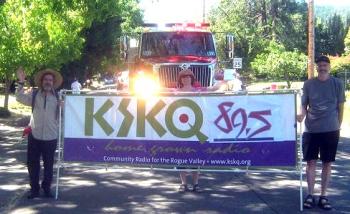KSKQ: Ready for Debut, Take Two

Ashland, Oregon's KSKQ is kicking it up a notch -- they're going full-power. KSKQ's licensee, the Multi-Cultural Association of Southern Oregon, fought for its LPFM license to bring corporate-independent media to the Rogue Valley. A local NPR affiliate has been broadcasting there since 1969, but "it's pretty much closed up" to real community programming, says Carson Bench, KSKQ's programming director. Still, many question why the Rogue Valley even needs another community radio station.
Well, what do you consider a "community" station? If it means locally-produced programming, KSKQ has a lock on it. The station wants to be 80% local, and is off to a great start. During the school year, Kids Unlimited works with KSKQ to produce Kids Radio Club. It trains middle schoolers in radio production and how to interview. On Sundays at 10PM, Bob Canape "combines his experiences in the Vietnam War with music from the era to illustrate a powerful story" on "No Underwear, No Name." You can hear Crossfire, a political talk show "that is live and local" on Saturdays at 10am...or can you?
The station has trouble being heard because of its antenna location. It's very close to a mountain that obscures the direct line of sight needed for good reception. It's difficult to hear even in your car when you pass under a stoplight. Thus, KSKQ doesn't have as much of a community presence as its wants. "How can they get excited about it if they can't hear it?" Bench asks. "Kind of a Catch-22."
KSKQ hopes bumping up to 195 watts from 18 will help. It's also moving to a better spot. US Cellular occupies the prime location in Rogue Valley and wouldn't return the station's calls. Good thing a private citizen offered the station space nearby. "Until we stabilize things, we aren't publicizing," says Bench. "If people tune in and can't get it, they aren't gonna try again." When things do settle down, Bench plans on taking advantage of local tabling opportunities. And, true to its community-building vision, KSKQ will have a town meeting in the Ashland Library asking locals, "What do you want in a station?"
The MCASO wants to use KSKQ to expose community members to different experiences and cultures. "The entity itself builds bridges," says Bench of the LPFM. You "air different likes, then people will be exposed to them," connecting someone to a culture he or she hasn't had contact with before. Bench hopes this will lead to "people embracing each others' differences, and a tighter knit community."
"The Valley doesn't look very culturally diverse," says Bench. But "a lot of people are coming. Things are changing." KSKQ wants to serve everyone. To cater to the area's large immigrant population, Bench would like to see more non-English programming. He is aiming for 30-40% Spanish-language programming in the future, in addition to Pacifica Informativa every day at 7pm.
A big part of starting and working with an LPFM is learning to enjoy the process, Bench says. "Don't get discouraged. If it takes a long time to get there that can be frustrating." He points out, "No matter what level you get to, you're always gonna see another level above you." The only way to deal with that is to enjoy the ride and stick to your vision. "You can't go anywhere without that vision." KSKQ has a long way to go, but with the help of the community it was created to serve, it will surely get there.
Thanks to Lucy Saunders-Pappentick for putting together this profile.
